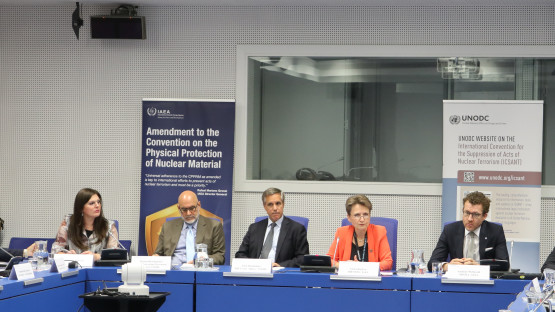
The synergies between the Convention on the Physical Protection of Nuclear Material (CPPNM) and its Amendment (A/CPPNM) and the International Convention for the Suppression of Acts of Nuclear Terrorism (ICSANT) in strengthening nuclear security globally were discussed at a side event last week during the 67th IAEA General Conference. The event was jointly organized by the IAEA and the United Nations Office on Drugs and Crime (UNODC) as part of their efforts in further promoting the universalization and effective implementation of the A/CPPNM and ICSANT.
In his opening remarks, Anthony Wetherall, Head of the Nuclear and Treaty Law Section at the IAEA underlined that “as we harness the peaceful uses of nuclear technology for the benefit of all, we must, at the same time, make sure that we recognize and address the threats posed by the potential misuse of nuclear material, other radioactive material and associated facilities by malicious non-State actors. This side event will reinforce the importance of a solid and robust legal framework as a foundation for effective nuclear security.”
The CPPNM and A/CPPNM remain the only internationally legally binding undertakings in the area of physical protection of nuclear material and of nuclear facilities used for peaceful purposes. The CPPNM and its Amendment also require criminalization of certain offenses involving or directed at nuclear material and nuclear facilities, and provide for international cooperation related to physical protection and preventing and responding to criminal acts. The ICSANT complements the A/CPPNM in covering all radioactive material and establishing a foundation for the criminalization of further offenses involving nuclear as well as other radioactive material.
“The A/CPPNM is pertinent for all countries, not just those with nuclear facilities or nuclear material. It provides for a strengthened international framework to combat nuclear terrorism and secure nuclear material, thus reducing the likelihood of malicious acts and enhancing the national security of each country,” said Elena Buglova, Director of the IAEA’s Division of Nuclear Security. She also highlighted the importance of joint efforts on promoting universalization and effective implementation of both A/CPPNM and ICSANT.
As of October 2023, there are 164 Parties to the CPPNM, of which 134 have joined the Amendment. Belarus and Zimbabwe became the latest Parties to the A/CPPNM during the IAEA 67th General Conference. Currently, there are 121 Parties to the ICSANT.
John Brandolino, Director of the UNODC’s Division for Treaty Affairs, emphasized that “both the CPPNM Amendment and ICSANT are among the international legal frameworks against terrorism that UNODC is mandated by the UN General Assembly to promote. For the past two decades, we have devoted increasing efforts and assisted Member States worldwide with becoming party to, and effectively implementing, these two key instruments.” He added that “while delivering its Canada and EU-funded programming on the international legal framework for nuclear security, UNODC will continue to cooperate with the IAEA and other partners within the UN system and beyond.”
Representatives of Lao People's Democratic Republic, Paraguay and Zimbabwe shared their national perspectives on the importance and benefits of joining the CPPNM and its Amendment and ICSANT, as well as their experiences with adherence to and implementation of these key international legal instruments.
Moukdavanh Sisoulith, Deputy Director General, Department of International Organizations, Lao PDR Ministry of Foreign Affairs, described her country’s perspective. “We firmly believe that a robust international legal framework serves as the cornerstone of an effective nuclear security regime. Our journey to adhere to the A/CPPNM included significant milestones, such as the development of a national nuclear security framework tailored to our needs, requiring a review and amendment of our policies to meet international standards,” she said, adding that Lao PDR “made a significant step in turning commitment into action, thereby demonstrating dedication to enhancing the national nuclear security architecture under A/CPPNM."
Paraguay’s Ambassador Juan Francisco Facetti emphasized the importance of the A/CPPNM and ICSANT and their synergies. “The A/CPPNM enhances the security of nuclear material, reducing the risk of it falling into the wrong hands. ICSANT ensures that those who attempt to use such material for malicious purposes are prosecuted and held accountable. Their synergy creates a robust framework that addresses the full spectrum of challenges, from physical protection to legal prosecution” he said, adding that “in a world where the movement of people, goods, and information knows no borders, the threat of nuclear terrorism transcends national boundaries. Understanding this means we must embrace the spirit of cooperation and shared responsibility embedded within these conventions.”
Justice Chipuru, Chief Executive Officer in the Radiation Protection Authority of Zimbabwe, said, “The impetus on the part of Zimbabwe was our continued commitment to the achievement of and maintenance of worldwide effective physical protection of nuclear material and nuclear facilities for peaceful purposes. This enabled us to overcome the challenges faced with ratification of instruments that are of a nuclear security nature as they take long to conclude through engaging with decision makers and key institutions.”
During the event, the IAEA and the UNODC also gave presentations highlighting the programmes they have made available to support and assist countries in adhering to and implementing the two Conventions.
Reproduced from https://www.iaea.org/newscenter/news/strengthening-nuclear-security-worldwide-through-acppnm-and-icsant